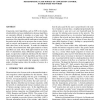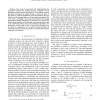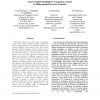INFOCOM
2012
IEEE
11 years 7 months ago
2012
IEEE
—In this paper we present a methodology for the design of congestion control protocols for background data transfers that have a minimal delay impact on short TCP transfers and c...
CN
2011
12 years 11 months ago
2011
—In this paper, we study the interactions of user-based congestion control algorithms and router-based switch scheduling algorithms. We show that switch scheduling algorithms tha...
ICNP
2009
IEEE
13 years 2 months ago
2009
IEEE
End-to-end rate-based congestion control algorithms are advocated for audio/video transport over the Internet instead of window-based protocols. Once the congestion controller has ...
WSC
2001
13 years 5 months ago
2001
Congestion control algorithms, such as TCP or the closelyrelated additive increase-multiplicative decrease algorithms, are extremely difficult to simulate on a large scale. The re...
CONEXT
2008
ACM
13 years 6 months ago
2008
ACM
In the context of mobile and pervasive networking, it is not uncommon to experience frequent loss of connectivity. Congestion control algorithms usually mistake resulting packets ...
HOTOS
1999
IEEE
13 years 8 months ago
1999
IEEE
Wide-area distributed applications are frequently limited by the performance of Internet data transfer. We argue that the principle cause of this effect is the poor interaction be...
CDC
2009
IEEE
13 years 9 months ago
2009
IEEE
— This paper is concerned with understanding the connection between the existing Internet congestion control algorithms and the optimal control theory. The available resource all...
ISCC
2003
IEEE
13 years 9 months ago
2003
IEEE
This paper presents a new active queue management scheme, Fuzzy Explicit Marking (FEM), implemented within the differentiated services (Diff-Serv) framework to provide congestion ...
CIT
2004
Springer
13 years 10 months ago
2004
Springer
End-to-end congestion control algorithms in TCP are designed for a highly co-operative environment with the assumption that the end hosts voluntarily participate in it and obey th...
SIGCOMM
2004
ACM
13 years 10 months ago
2004
ACM
All Internet routers contain buffers to hold packets during times of congestion. Today, the size of the buffers is determined by the dynamics of TCP’s congestion control algor...



